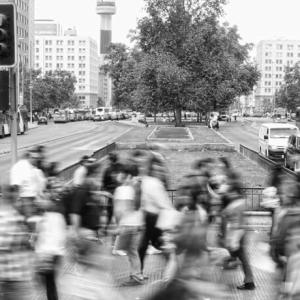
ITS Monday: Edition 25, 2023

A small collection of curated content from the worlds of intelligent transport systems, smart mobility, and associated areas.
Included this week, Net Zero emission target trouble, making biking better, EV charging standards. Queensland tran news, and more.
The article headlines below are:
- Transportist: Psycho-Accessibility
- Ride on time: Go big, be bold – it’s time to make biking better
- Funding walking and cycling
- Lyft, the largest bikeshare operator in North America, wants out of the business
- Home-charging change could put brakes on electric cars
- More automakers are adopting Tesla’s EV charger. But the competition won’t go quietly
- Gold Coast light rail smashes records – but Sunshine Coast stuck at the station
- Auckland Transport boss says city won’t even get halfway to 2030 climate targets at this rate
And just in case you hadn’t caught it yet, we have a recent series of interviews with transport professionals – Effects of COVID on the transport sector – what they see now, what they would like to happen post-pandemic, and what they think will happen. If you’d like to be join this conversation, drop us a line!
This week’s articles
Now, scroll down, and see what’s in this week’s edition. Oh, and before you do, be sure check out the quickest way to receive our new content via the subscription box just below …


Transportist: Psycho-Accessibility
Professor David Levinson‘s latest Transportist blog. “In the context of people’s perceptions of accessibility, “psycho-accessibility” could be defined as “How mental or cognitive factors influence an individual’s perception of how accessible a certain product, service, or environment is”.”
READ THE ARTICLE
Ride on time: Go big, be bold – it’s time to make biking better
An article written by Ben Beck, ARC Future Fellow, Head of Sustainable Mobility and Safety Research, School of Public Health and Preventive Medicine, at Monash University. “Bike-riding also has the potential to dramatically reduce emissions. In Australia, transport is the second-largest, and fastest-growing, source of emissions. Despite what some people believe, electric vehicles aren’t the sole solution to this problem – they don’t get people active, and they don’t fix traffic congestion.”
Related iMOVE project: Safer cycling and street design: A guide for policymakers
READ THE ARTICLE
Another piece on cycling, this one from LinkedIn, and written by Marc Lane. Principal, Cities, at WSP Australia. “You, like me, may have heard an oft-quoted statement that “the UN recommends 20% of transport budgets are spent on walking and cycling”, and been puzzled to find the source of this recommendation.”
Related iMOVE content: Micromobility
READ THE ARTICLE
Lyft, the largest bikeshare operator in North America, wants out of the business
“This tension between profitability, demand, and running the best possible bikeshare system comes to a head when the operator is a taxi company using the bikeshare system to get people to, ultimately, take more taxi rides.”
READ THE ARTICLE

Home-charging change could put brakes on electric cars
“A proposal to let Queensland power providers disconnect electric vehicles during peak periods has been slammed as an “unbelievable” disincentive that could prevent the state reaching its emission-reduction goals.”
Related iMOVE content: Electric vehicles: Supporting uptake, investigating smart charging
READ THE ARTICLE
More automakers are adopting Tesla’s EV charger. But the competition won’t go quietly
Speaking of disruption on the topic of electric vehicle charging infrastructure, this news from the USA. “Nissan is the latest EV manufacturer to announce it’s adopting Tesla’s North American Charging Standard connectors, following similar moves by Volvo, Ford, GM and other carmakers.”
READ THE ARTICLE
Gold Coast light rail smashes records – but Sunshine Coast stuck at the station
“Passengers have been so quick to reboard light rail at the Gold Coast, it has become the fastest-recovering public transport network in Australia since the pandemic. But further north at the Sunshine Coast, it appears commuters are stuck at the station, so to speak, for two years.”
READ THE ARTICLE
Auckland Transport boss says city won’t even get halfway to 2030 climate targets at this rate
“Auckland Transport (AT)chief executive Dean Kimpton has told Stuff that on the current path, he thinks only about 40% of the Transport Emissions Reduction Pathway (TERP) 2030 goals would be achieved.”
Related iMOVE contentt: FACTS: A Framework for an Australian Clean Transport Strategy
READ THE ARTICLEDiscover more from iMOVE Australia Cooperative Research Centre | Transport R&D
Subscribe to get the latest posts sent to your email.


